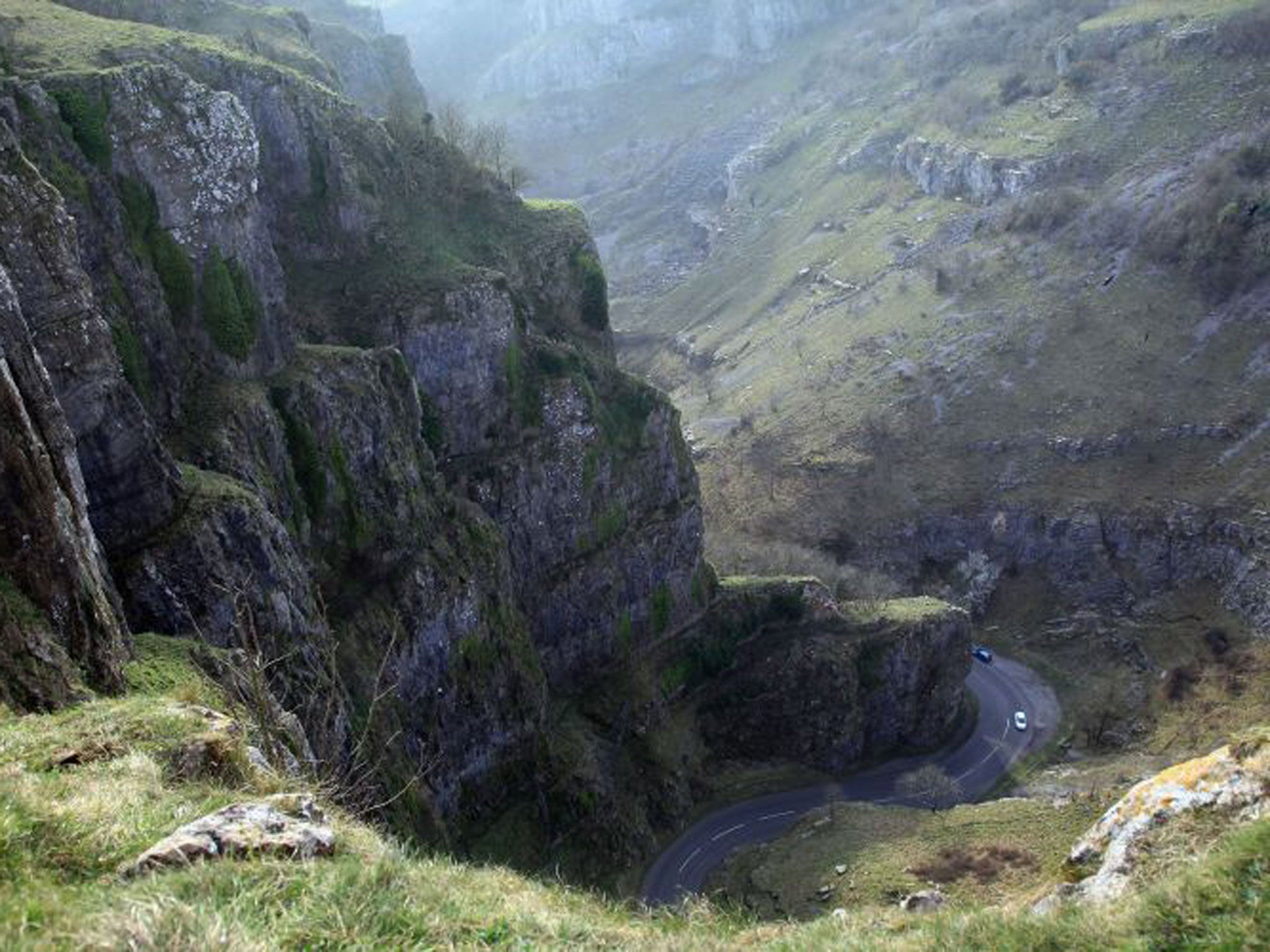Rejuvenation? Or a blot? The great divide over Cheddar Gorge cable car
After decades of decline, Lord Bath says his £10m scheme can rejuvenate his side of the tourist attraction, but local people and the National Trust fear a blot on the landscape

Your support helps us to tell the story
From reproductive rights to climate change to Big Tech, The Independent is on the ground when the story is developing. Whether it's investigating the financials of Elon Musk's pro-Trump PAC or producing our latest documentary, 'The A Word', which shines a light on the American women fighting for reproductive rights, we know how important it is to parse out the facts from the messaging.
At such a critical moment in US history, we need reporters on the ground. Your donation allows us to keep sending journalists to speak to both sides of the story.
The Independent is trusted by Americans across the entire political spectrum. And unlike many other quality news outlets, we choose not to lock Americans out of our reporting and analysis with paywalls. We believe quality journalism should be available to everyone, paid for by those who can afford it.
Your support makes all the difference.The Marquess of Bath has been offending people of a conservative bent for years. Whether it’s his 75 “wifelets” (some of whom live on the grounds of his Wiltshire estate and safari park) or his family (the “Loins of Longleat” boycotted his son’s wedding this year after he took down from his quarters some murals that Lord Bath had painted of children playing with animals), the peer’s flamboyant lifestyle has been a consistent source of irritation. Now he has fallen foul of the people of Cheddar Gorge, thanks to his estate’s plan to run a cable car down the middle of the valley in a bid to boost flagging tourist revenues.
The plan has opened up a divide around the gorge that pits Lord Bath against the National Trust, which vehemently opposes the scheme.
Lord Bath controls the south side of the gorge, which includes the world-famous caves and most of the commercial element of the “honey pot” natural attraction, with the National Trust owning the north.
“This is the equivalent to trying to build a cable car in front of Buckingham Palace,” said Helen Bonser-Wilton, assistant director of operations at the National Trust. “Cheddar Gorge is of international importance. There are better ways of driving business without destroying the very asset people come to see. It is far better to retain the uniqueness of the place,” she added.
The National Trust is backed by many of the locals who argue not only that the proposed £10m, 18-gondola cable car ride will spoil the view but that it will cheapen the experience adding a “fairground ride” that will make the beauty spot feel more like an amusement park.
The gorge has a host of designations, such as being an Area of Outstanding Beauty, a Site of Special Scientific Interest, a Special Area of Conservation and an Archaelogical Site of National Importance. However, while the National Trust can – and has – denied permission for the cable car to run over its portion of the gorge, it has no power to prevent the project going ahead along the proposed route, except to lobby the planning authorities hard.
For its part, Longleat Estate says it is sensitive to concerns about the cable car, before pointing out that, unlike the National Trust, a charity surviving on grants, it is a private company that has to generate its own income.

Whereas the National Trust has restricted the commercial aspect of its part of the gorge to the bare minimum, the Longleat Estate offers a commercial package including two caves, a lookout tower, a museum and an open-top bus tour. Visitor numbers to its portion of the gorge are declining so rapidly – from 400,000 in its heyday in the late 1970s and early 1980s to just 150,000 now – that something has to be done, argues Hugh Cornwell, director of Cheddar Gorge and Caves for the Bath family.
“Visually the cable car is a downside although the visual signature is quite small. Set against that are the economic and employment benefits and the wildlife benefits – because the income generated will allow us to do more to maintain the area. It all needs looking after and paying for and if we don’t do it, what alternatives are there?” said Mr Cornwell.
Still, the cable car would only run along 600 metres of the three-mile gorge, he said. Mr Cornwell concedes that some of the extra profits he hopes would be generated by the cable car would go into Lord Bath’s pocket, but says much of it would be used for badly needed local regeneration.
“Since the peak in the late 1970s we have seen footfall and the income derived fall dramatically. There aren’t many things you can do to resuscitate things,” he said.
Mr Cornwell blames the rise of cheap foreign holidays and the growth of shopping as a leisure activity – most notably in the form of the giant Cribbs Causeway shopping mall nearby.
Furthermore, the architecture of the lower gorge doesn’t help, which is mostly from the 1960s and 1970s, he says. This means that a lot of the people who might have considered holidaying around the gorge are opting for Tuscany instead, where the architecture matches the natural beauty – although the weather may also help.
“We can use some of the proceeds from the cable car to improve the area by improving the architecture,” said Mr Cornwell, adding that some of the cash could also be used to subsidise rents for small independent shops.
The cable car idea has been bandied about for years, but the project is fast gathering momentum. Mr Cornwell hopes to put the plan to public consultation in January and make a formal planning application in February or March, expecting an appeal either way. If the project is approved, he hopes to have the cable car built and up and running by Easter 2016.
Professor Chris Lewis, chairman of the Campaign to Protect Rural England in Somerset, is strongly opposed to the scheme, although he does concede that the gorge is “very run down compared to 20 years ago and needs a lot of investment”.
“Everybody realises that something has to be done and that we need some kind of investment, but the cable car is not acceptable. We need a bigger set of ideas, a proper plan,” he said.
But what might the solution be? Alternative ideas seem to be quite thin on the ground.
“More could be made done to present the cave better and we could make the whole thing more of a natural experience, more of a wildlife experience,” suggested the National Trust’s Ms Bonser-Wilton.
Lord Bath and his estate are in an unenviable position. Something drastic clearly needs to be done – and a cable car is certainly drastic. But there is a danger that it could alienate more people than it attracts – not to mention the locals. On that front, however, he has probably developed a pretty thick skin by now.
LORD BATH CONTROVERSIES
By Matthew Moore
Lord Bath, a keen painter, has decorated his bedroom walls with scenes from the Kama Sutra. The images of amorous couples – along with his other hand-painted murals in Longleat – are said to be highly-flammable, forcing the local fire brigade to draw up specific plans for a blaze at the property.
In 2011 two of Lord Bath’s “wifelets” allegedly came to blows over which one of them was going to spend the night with him. One of the women was arrested on suspicion of ABH ; the other was taken to hospital suffering cuts and a suspected broken nose. No charges were brought.
Last year villagers living near Lord Bath’s estate complained that they had been banned from walking or cycling on his land. Ramblers accustomed to having free access to the 100,000-acre grounds said they were being stopped by security staff and told to buy a £27.50 day pass. Longleat confirmed it had restricted access to parts of the estate in winter months after a series of security incidents.
Join our commenting forum
Join thought-provoking conversations, follow other Independent readers and see their replies
Comments